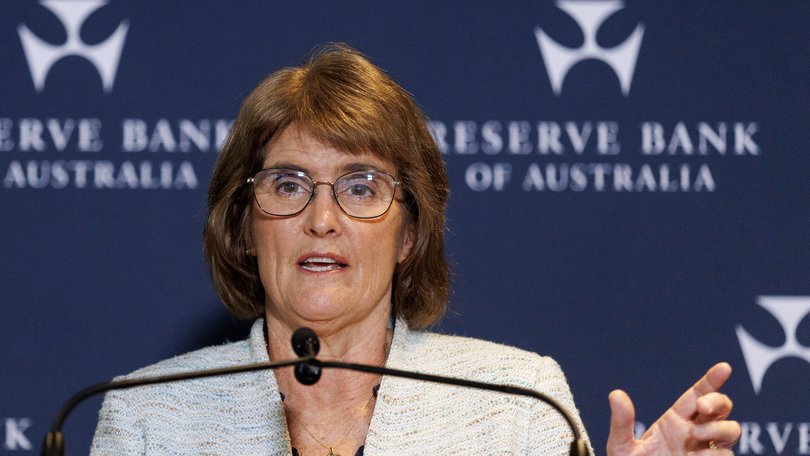Reserve Bank of Australia minutes for November hints inflation could be worse than expected and ‘persistent’
The Reserve Bank has given a strong hint that inflation may fail to moderate anytime soon. This is sure to disappoint borrowers hoping for more relief.

The Reserve Bank of Australia’s board is worried it has failed to bring inflation under control, notes from a meeting two weeks ago have revealed, further diminishing the prospects of interest rate cuts.
The minutes of the November 3 and 4 meeting, which held rates steady at 3.6 per cent, show the central bank’s monetary policy board members questioned whether an inflation spike in September was temporary, given the surge in the consumer price index followed the end of State government electricity rebates.
“Strength in several components pointed to the possibility that some part of the increase might prove persistent,” it said.
Sign up to The Nightly's newsletters.
Get the first look at the digital newspaper, curated daily stories and breaking headlines delivered to your inbox.
By continuing you agree to our Terms and Privacy Policy.The minutes of that Melbourne Cup day decision, released on Tuesday, also suggested some board members felt interest rates were no longer crimping consumer spending, a crucial distinction because some private sector economists think rates may have to rise to staunch inflation.
“On balance, members judged that financial conditions were still slightly restrictive but that it was also possible this was no longer the case,” it said.
RBA Governor Michele Bullock and her nine-member board this month left interest rates on hold for a second consecutive meeting after new official data showed headline inflation soaring to 3.2 per cent in the year ended September 30.
Underlying inflation, without volatile items, was also high, at 3 per cent, which was at the top of the RBA’s 2 to 3 per cent target.
The RBA updated its forecasts earlier this month to have this trimmed mean inflation measure remaining above target until second half of next year, and not return to the mid-point of the RBA’s target band until at least early 2028.

“While the staff did not expect quarterly inflation to be as strong in the December quarter as in the September quarter – as some of the recent increase was judged to be due to temporary factors – underlying inflation was now expected to be above 3 per cent until the second half of 2026,” it said.
The expiry of the Federal Government’s $75 quarterly electricity rebates at the end of December was also expected to keep the consumer price index elevated next year. This is putting political pressure on Prime Minister Anthony Albanese and his Treasurer Jim Chalmers to extend the rebates again, like they did in the pre-election March Budget, to artificially keep a lid on inflation.
Queensland’s $1000 annual rebate was discontinued by the State’s new Liberal National Party government, and ended early on June 30 as Western Australia’s Labor government declined to extend its $400 electricity credit.
“Headline inflation was expected to be higher than underlying inflation over this time, as earlier electricity rebates end,” the minutes said.
The RBA’s last monetary policy board meeting was held nine days before new Australian Bureau of Statistics data showed unemployment falling back to 4.3 per cent in October, down from a four-year high of 4.5 per cent in September.
Nonetheless, they were concerned about tight labour market conditions adding to inflationary pressures during a period of flat productivity growth, which would see wage increase costs passed on to customers.
“Members also noted that a range of indicators of capacity in the labour market still pointed to some remaining tightness, notwithstanding the recent easing in the data,” the minutes said. “These included the low underemployment rate, high level of job vacancies and the above-average share of firms reporting difficulties finding workers.”
Two of Australia’s Big Four banks, Commonwealth and NAB, now say the RBA is done with rate cuts. ANZ and Westpac still see one more rate cut occurring in February next year.
The Commonwealth Bank, Australia’s biggest home lender, said inflation was likely to remain a problem next year even if the economy continued to grow at a weak pace.
“We generally see the speed limit of the Australian economy being reached in coming quarters and inflation pressures persisting,” CBA’s head of Australian economics Belinda Allen said. “We don’t expect any major shift in tone from the RBA this year.”
But ANZ senior economist Adelaide Timbrell noted the RBA minutes were also concerned about weaker economic growth “if households are more cautious about spending than had been assumed” and the labour market weakened.
“On the potential need to cut the cash rate further in future meetings, the board noted the downside risks to activity,” she said.

